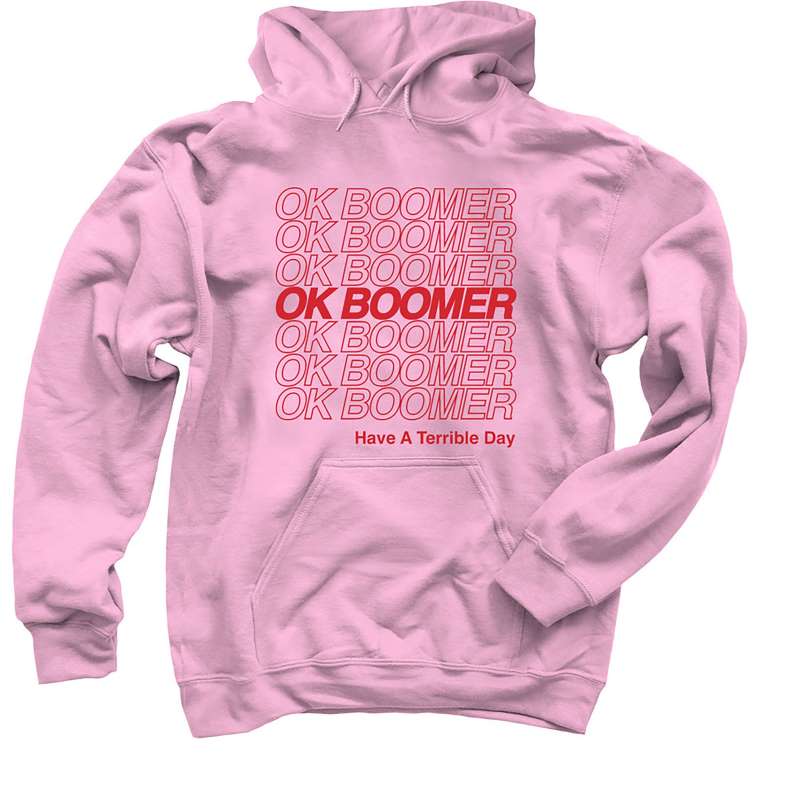“OK Boomer.”
Teen Shannon O’Connor, 19 years old, profited off of the “OK Boomer” controversy by making and selling merchandise with “OK Boomer Have A Terrible Day” written on them.
“OK Boomer”, the verbal eyeroll of a response for an upset generation. “OK Boomer” signifies the anger and dismissal of generation Z, (aka Gen Z), in the face of Boomers, also known as the Baby Boomers. Baby Boomers are people who were born in the years of 1944 and 1964. But “OK Boomer” isn’t unique to teenagers, and the phrase has grown in popularity to the point where teachers have begun to hear the phrase in circulation around classrooms.
“What I love about ‘OK Boomer’ is that it is dismissive, instead of trying to argue, it is just ‘whatever,’” said Jennie Drummond, an art teacher Monte Vista.
However, not being born in the Boomer birth years does not always mean you are safe from “OK Boomer.” “OK Boomer” can be directed at anyone who displays a resistance to or misunderstanding of technology, a misconception of new cultural norms, and anyone with outdated or strongly conservative political views, where they resist forward progress in society. “OK Boomer” is cold-shouldered, a phrase used when the argument of who’s right becomes so pointless that an entire generation just dismisses the other. But these arguments between generations are not new. There’s always been disagreement about society between young and old, and there always will be.
“Between every generation, even listening to my parents talk about their relationships with their parents, these arguments for change have always happened,” said Drummond.
Not everyone uses the phrase, and for many, it has become somewhat of a joke for Gen Z whenever an older person does anything annoying to them.
“Kids usually say it to their parents, even if their parents aren’t actually Boomers,” sophomore Taylor Christian said.
But for those more serious in their concerns, you’ll find that Gen Z feels that the argument for change has become so twisted and stagnant that Boomers are stuck in their view. Now, Gen Z is no longer willing to spend hours explaining their points and why they matter, when the listening Boomer will simply ignore it with the insistence that the internet is “rotting our brains.”
A prime Boomer argument is we could all afford houses and insurance if we just buckle down, work hard, and stop eating avocados.
“OK Boomer”, simply, is a way of saying that the Boomers can argue and drag their feet in the mud as much as they want, but we will continue to fight their policies that repress and harm our views and our planet, and we will succeed.
But by no means is “OK Boomer” just for Gen Z to use, it is for anyone advocating for change. Whether Millennial, Gen X, or Boomers with current political views and an accurate vision of change and equality. “OK Boomer” is not meant as an insult, but as a declaration that we will no longer stand under the onslaught of insults hurled at us by the same people who made a global scale mess and expect us to clean it up.
When they make mistakes, we are the ones left to clean up the mess. We are “snowflakes” for being offended by racist, misogynistic, homophobic, or classist jokes. We are “lazy” for not being able to buy a house in their ruined economy yet arrogant for starting new companies. We are “sheltered” when we use technology to better our lives even though it helps them just as much. We are “stupid” for enjoying internet entertainment made by people rather than corporations. We are “trying to be victimized” when we express our gender, sexuality, clothing choice, or anything that fights the toxic norms set for us.
OK Boomer is a dismissal, a simple statement that declares that we don’t have to listen to you or your views, we are looking to the future. But this future isn’t just for the youth, and as “OK Boomer” fades with all outdated internet trends to insignificance, the message of change in the youth will continue to burn bright.

Elisabeth Delpouys is a junior at Monte Vista high school, as in her second year of Journalism. Elisabeth...







